Mission: Impact podcast & blog
Build a better world without becoming a martyr to your nonprofit cause
Listen on:
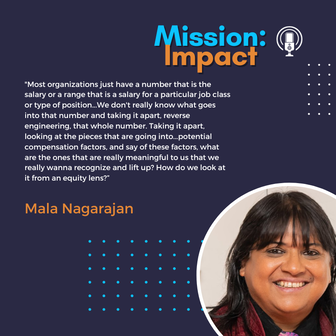 In episode 85 of Mission: Impact, Carol Hamilton and Mala Nagarajan discuss organizational development, compensation structures, and critical discussions within nonprofit organizations. They explore the limitations of market-based compensation, the concept of a thriving wage, and the importance of aligning organizational values with employee compensation. Mala emphasizes the need for transparent and comprehensive approaches to compensation, touching on various factors such as areas of responsibility, risk assessment, and the significance of understanding one's relationship with money. In addition they explore how to integrate compensating for the emotional labor required in a role. They discuss the complexities of legal considerations and highlight the need for organizations to reevaluate traditional practices to foster a more equitable and holistic work environment. Highlights:
02:27: Creating equitable compensation models for organizations 04:50: Principles underpinning the work 08:16: The importance of interdependence 13:08- Transparency in compensation 16:21 Emotional labor and compensation 26:00 - Recognizing individual strengths and aligning them with organizational roles beyond just financial incentives 32:00 - Biases and values embedded in market-based compensation structures 37:00 - Implementing a thriving wage, distinct from a living wage 45:00 - The "conditions for readiness" necessary for successful implementation 53:00 - Assessing risk tolerance Guest Bio: Mala Nagarajan is a senior HR consultant who works with nonprofit organizations rooted in racial and social justice values. She is driven by a vision of strong organizations working collaboratively toward a common purpose and approaches her HR work with a values-aligned, people-centered, and movement-oriented lens. Mala is a consultant with RoadMap, a national network of consultants who work with social justice organizations. She helped organize RoadMap’s HR/RJ (racial justice) working group. Mala has developed an innovative Compensation Equity Process and Calculator™ that reverse-engineers supremacy out and re-engineers equity in. It’s an evolving approach accompanied with a custom tool that organizations can use to shift from a market-based to an anti-racist compensation model that centers those living at the intersections of multiple marginalized communities. Important Links and Resources: Mala Nagarajan - https://www.linkedin.com/in/malanagarajan/ Vega Mala Consulting | www.vegamala.com Marilyn Waring TED talk on what the GDP misses -- https://www.tedxchristchurch.com/marilyn-waring Polarities: https://www.polaritypartnerships.com/ The MIT Living Wage Calculator: https://livingwage.mit.edu/ Hidden Brain episodes on budgets: https://hiddenbrain.org/podcast/money-2-0-why-we-bust-our-budgets/ Learn more about Mala’s compensation work here: Fund the People: Compensation Philosophy, NPQ-Compensation Equity: A Values-Based Framework & Implementation Guide, Top Tips to Stop Widening the Wealth Gap, Why Radical Human Resources is Critical for Movement Organizations, Equitable Compensation is a Risk Worth Taking, Brave Questions: Recalculating Pay Equity, Don't Put Metal in the Microwave and other Compensation Myths, Transforming the Workplace: HR Innovations, Pay Scale Equity Process and Calculator. HR resources: RoadMap Consulting: Human Resources and Justice: Addressing Racism and Sexism in the Workplace. Washington Nonprofits: Workers in Nonprofits. The Management Center: Making Compensation More Equitable. Click "Read More" for transcript 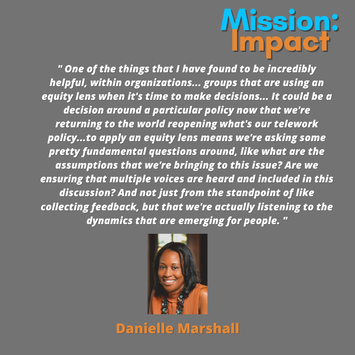 In episode 56 of Mission: Impact, Carol and her guest, Danielle Marshall discuss:
Guest Bios: Danielle is an inclusive leader focused on strengthening collaboration among teams, leaders, and stakeholders to foster problem-solving, create solutions, and improve culture. She finds inspiration in leading systemic change work that promotes equity and inclusion. Danielle has worked in the nonprofit sector for 20+ years most recently having served as the Executive Director for Playworks Mid-Atlantic. Danielle went on to found Culture Principles in response to a persistent need to move organizations beyond DEI statements to develop strategic and actionable equity goals. Danielle holds a Master's degree in Industrial-Organizational Psychology from Louisiana Tech University and draws on her background as an I/O psychologist in applying a racial equity lens to organizational policies, practices, and programs. She is a Certified Diversity Professional (CDP)/Executive Coach. Important Links and Resources:
Click "Read More" for Transcript: Helping nonprofits boards move toward greater equity with Christal Cherry and Renee Rubin Ross8/23/2022
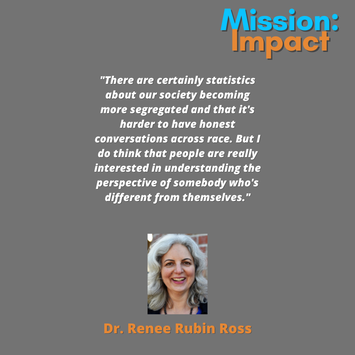 In episode 55 of Mission: Impact, Carol and her guests, Dr. Renee Rubin Ross and Christal Cherry discuss:
Guest Bios: Dr. Renee Rubin Ross is a nationally recognized strategic planning and board development consultant. Committed to racial equity in the nonprofit sector, Dr. Ross supports organizations and individuals in practices that celebrate and amplify diverse voices and perspectives. Christal M. Cherry is a nationally recognized nonprofit executive and professionally trained fundraiser. With over 20 years in the nonprofit sector, she has supported higher education institutions, human services organizations and faith-based missions. Her career portfolio, as a full time professional and consultant includes American University, the United Negro College Fund, Spelman College, Nicholas House, the Interdenominational Theological Center, Florida A & M University, Action Ministries, and the GA Center for Nonprofits. In each role, Christal has interfaced, guided and collaborated with diverse boards made up of college presidents, ministers and bishops, politicians, corporate CEO's, civic leaders, consultants, attorneys, stay at home moms and students. With passion and a wide breadth of experience, Christal works today with clients to help them mark a clear path to success in board development. Her style is electrifying, inspiring, and energizing. Christal earned a MA in Counseling from Hampton University, a BA in Liberal Arts from Hofstra University and professional development certifications in nonprofit leadership, social media fundraising, and nonprofit management. She currently serves on the board of the Greater Atlanta chapter of the Association of Fundraising Professionals and the Villages of Carver YMCA. She is regular presenter with CANDID, Qgiv, Network for Good, Bloomerang, and the Mississippi Alliance of Nonprofits and Philanthropy where she facilitates webinars and teaches courses in fundraising, board development and equity and inclusion. Christal has been a guest on multiple podcasts and enjoy serving as a requested expert on board matters. She is contributing author in Collecting Courage, a documenting of racism and survival by 14 accomplished Black fundraisers working across North America. She also enjoys her membership in the African American Development Officers Network, Toastmasters, and F3, Fabulous Female Fundraisers which she founded. Important Links and Resources:
Click "Read Morea" for Transcript: 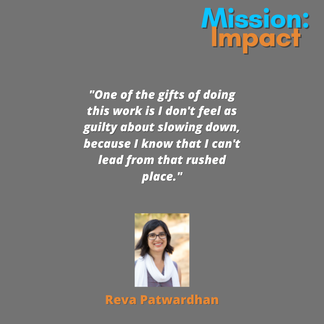 In episode 53 of Mission: Impact, Carol and her guest, Reva Patwardhan discuss:
Guest Bio: Reva Patwardhan is the founder of Greater Good Coaching. She works with nonprofit leaders who’ve followed their hearts into careers of service and advocacy. She helps them discover their innate strength, resilience and confidence, so they can use their careers to make the impact they want in their lifetimes. She has 20 years of experience in the nonprofit sector as a fundraiser, communications director, lobbyist, board member, facilitator, coach and diversity trainer. Reva co-facilitates small experiential learning groups with the Stanford Graduate School of Business. She chairs the Board of Directors at Rethink Media. She is a certified Integral Coach, and a member of the International Coaching Federation. Important Links and Resources:
Click "Read More" for Transcript: 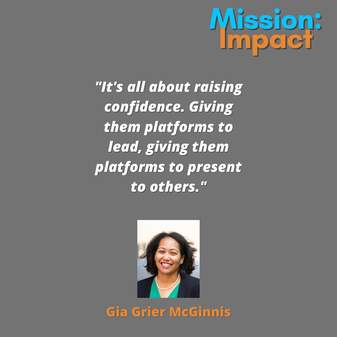 This episode is the final part of the Culture Fit project that Carol recorded with her son-in-law Peter Cruz. In this episode, Carol, her cohost Peter Cruz, and their guest Dr. Gia Grier McGinnis discuss:
Dr. Gia Grier McGinnis is a senior leader with over 17 years of broad-ranging experience in program management, advocacy, and community outreach. She has a passion for public engagement in STEM, and currently serves as the Executive Director of the UMB CURE Scholars Program, a groundbreaking healthcare and STEM pipeline program for West Baltimore youth. Dr. Grier McGinnis is a Baltimore, Maryland native where she still resides with her family. She enjoys exploring urban green spaces and volunteering to promote mental health awareness. Important Links and Resources:
Click "Read More" for Transcript: |
Archives
April 2024

Grace Social Sector Consulting, LLC, owns the copyright in and to all content in and transcripts of the Mission: Impact podcast, as well as the Mission: Impact blog with all rights reserved, including right of publicity.
|
Telephone301-857-9335
|
info[at]gracesocialsector.com
|
Grace Social Sector Consulting, LLC, owns the copyright in and to all content in, including transcripts and audio of the Mission: Impact podcast and all content on this website, with all rights reserved, including right of publicity.
|